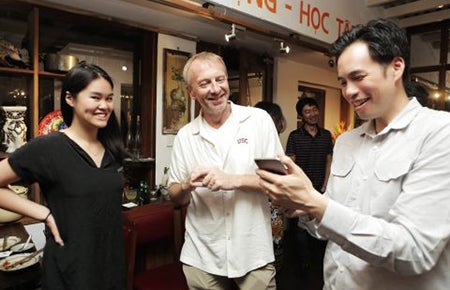
Calling on students to develop fresh approaches to total patient care
What if we put as much innovation design talent and thought into the patient experience as we do into our cellphone cameras and dating apps?
The USC Jimmy Iovine and Andre Young Academy wants to find out. This week, the academy announced a $425,543 grant from the Phase ONE Foundation, a nonprofit organization dedicated to cancer research, that will initiate a full-scale, four-year undergraduate track focused on health innovation to help patients achieve better outcomes.
The interdisciplinary undergraduate track is anticipated to launch in Fall 2019.
As part of this new educational track, students will be immersed in information-rich learning, interacting with physicians, scientists, patients and graduate students to develop innovative health solutions aimed at improving patient outcomes.
“Phase ONE’s gift ensures we have the resources to continue to provide best-in-class education and develop innovative, agile thinkers who will help to shape the future of the health industries,” said Erica Muhl, dean of the USC Iovine and Young Academy and the USC Roski School of Art and Design.
The convergence of biotech and design innovation
The academy has already started to lay the groundwork for this new course of hands-on study. Since last year, students have been working with USC’s Convergent Science Initiative – Cancer led by Peter Kuhn, Dean’s Professor of Biological Sciences. Kuhn is a founding faculty member at the USC Michelson Center for Convergent Bioscience, a 190,000 square-foot facility made possible by a $50 million gift from retired orthopedic spinal surgeon Gary K. Michelson and his wife, Alya Michelson.

Peter Kuhn, center, talks about using social media to securely and anonymously share disease data for research purposes. Photo by Phuoc Van Nguyen.
Alongside faculty, physicians, researchers and patients in Kuhn’s lab, the students have been helping to develop CancerBase, a quantitative social networking platform that enables cancer patients to map and understand their own disease and situation along the disease development path. CancerBase was featured at former Vice President Joe Biden’s Cancer Moonshot in June 2016, as well as former President Barack Obama’s White House South by South Lawn Festival in October 2016.
In working with CancerBase, the students have focused on designing a user experience that effectively allows patients to open up about their care experience with other patients. Students are using the innovation design philosophy and the principles of popular user interaction platforms like Facebook and Twitter to produce a connective and empowering experience for patients anywhere in the world. Researchers can then use the data shared by the CancerBase participants to better understand how the disease works on many different levels.
“Cancer is so much of an unknown to the patient due to its complexity, but we do know so much more today about the disease then we ever did. However, it is challenging to bring this knowledge to the patient in a meaningful way. It is clear that we have to take the patient into consideration as much as the disease itself, so we are laser-focused on patient-centered innovation,” said Kuhn, who is also a professor for the Keck School of Medicine of USC and the USC Viterbi School of Engineering.
A hub for convergent bioscience
The immersive cancer module organized by the academy, which continues through the start of the new health innovation track in 2019, will allow students to have access to Kuhn’s lab at Michelson Hall, USC’s hub for convergent bioscience.
At the newly opened Michelson Hall, scientists and engineers from USC Dornsife, USC Viterbi and the Keck School of Medicine are working to solve some of the greatest intractable problems of the 21st century in biomedical science, from a fundamentally new understanding of the cell to new approaches for cancer, neurological and cardiovascular disease.
For the academy’s undergraduate track on health innovation, students will work closely with the Michelson Center’s premier network of scientists and engineers, whose portfolios include a long history of research and innovation, including new therapies and diagnostics.
In 2019, students in the health track will have another new hub where they can hack cancer: Iovine and Young Hall.
“We are turning silos into pillars of the future,” Kuhn said. “Academy students are very well-equipped at helping us discern the problem and then putting together the pieces to solve it.”